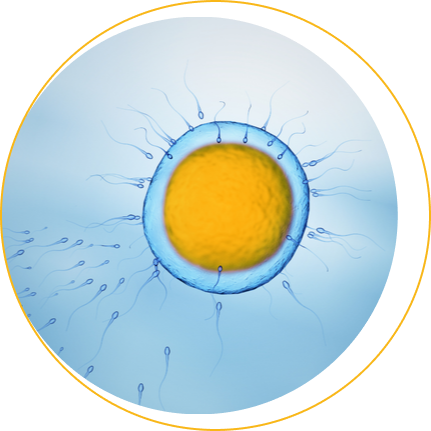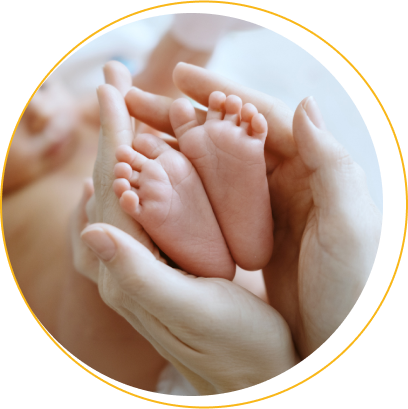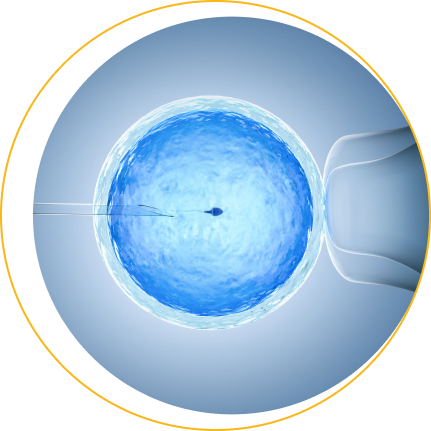


In Vitro Fertilisation (IVF)
Since 2008, GENNET has been helping infertile couples fulfill their dreams of a family using donated cells. Thanks to our well-developed donor program, we have an extensive database of donors. We consistently achieve high treatment success rates, making us one of the top European clinics in the field of assisted reproduction. This is evidenced by our portfolio of patients, who come to us not only from the Czech Republic but also from all over the world.
Who is Infertility Treatment Using Donor Sperm Suitable For?
Who is Infertility Treatment Using Donor Sperm Suitable For?
Infertility treatment with donor sperm can help couples conceive their own child in cases where the man:
- Has undergone a sperm analysis (spermiogram) that shows significant abnormalities, requiring the use of donor sperm (e.g. low sperm count, poor motility, or low-quality sperm).
- Has undergone sterilisation via vasectomy, suffers from erectile dysfunction, or has blocked spermatic ducts, and surgical methods such as TESE are unable to retrieve any sperm.
- Has undergone cancer treatment and has no viable sperm (including frozen sperm).
- Suffers from prostate or testicular cancer and does not have any frozen sperm available.
- Has a genetic condition that he does not wish to pass on to the child.
- Has other health issues, as assessed by an IVF specialist.

Types of Infertility Treatment Using Donor Sperm
Types of Infertility Treatment Using Donor Sperm
At GENNET, we use donor sperm for the following types of infertility treatment:
Intracytoplasmic Sperm Injection (ICSI) is the most commonly used micromanipulation technique in in vitro fertilisation (IVF). During ICSI, a single sperm is injected directly into the cytoplasm of each egg using a special device called a micromanipulator. The embryologist selects the sperm based on a careful examination of the semen under a microscope. The method is used exclusively for treating infertility through IVF (in vitro fertilisation), that is, through external fertilisation.
The success rate of fertilising eggs with this method is around 90%.
At GENNET, ICSI is a standard part of all treatment packages.

Treatment Success Rates
Sperm donors are young men in excellent physical, mental, and overall health. Before the donation process, each donor must undergo a series of detailed medical examinations. This ensures high quality of all donor sperm, contributing to the better quality of the resulting embryo and the overall treatment success. Donors also undergo extensive genetic testing and screenings for sexually transmitted diseases.
However, the quality of the embryo is determined not only by the quality of the sperm but also by the egg quality. The following factors on the woman's side can significantly influence her chances of successful conception and carrying a healthy baby to term: age, personal health history.
Success rate of the IVF program according the age
-
The number of all cycles
at the Gennet clinics Almost 5000 -
Success rate
Donor program 69 % -
Success rate of the IVF
treatment more than 40 %
Cost of IVF Treatment with Donor Sperm
At GENNET, we provide individualised care for each couple, so the final treatment cost depends on many factors and varies for each patient couple.
Special laboratory methods can significantly increase the chances of pregnancy. The most suitable treatment approach for each couple will be recommended by the doctor or embryologist. However, the final decision to use these methods is always up to the patients.
The cost includes:
- Initial consultation and examination with the doctor
- Consultations during the IVF cycle
- Tests for HIV, Hep B, C, and Syphilis for the partner
- Egg retrieval and general anaesthesia
- Thawing of the donor sperm sample
- Embryo transfer
The cost does not include:
- Additional laboratory methods (Depends on the recommendations of the doctor/embryologist and the client's preferences.)
- Additional costs for medication


Your stories
IVF Treatment with Donor Sperm: Step-by-Step Process
The IVF process with donor sperm is similar to a standard IVF cycle, with the main difference being that instead of fertilising the partner’s eggs with the partner’s sperm, the eggs are fertilised with donor sperm.
The basic principle of IVF with donor sperm involves hormonal stimulation of the ovaries to produce an optimal number of follicles, from which eggs (female gametes) are retrieved. In the embryology lab, the eggs are then fertilised with the donor sperm. After 2 to 5 days of culture, the embryologist selects the embryo with the greatest potential for successful implantation in the uterus. This selected embryo is then transferred back into the patient’s uterus during a short, painless procedure called embryo transfer.

Book a free initial consultation with our IVF specialist. You can have the consultation online from the comfort of your home, or we are happy to meet you in person at our clinic, depending on your preference.
During the initial consultation with our experienced IVF doctor, you and your partner will discuss your medical history, particularly in relation to your reproductive health. If you choose to have the consultation in person at our clinic, the doctor may also perform a basic gynaecological examination on the female partner.
Based on this information, the doctor will then determine a possible treatment plan. If necessary, they may recommend additional tests to refine the diagnosis and better target the treatment.
If you have an in-person consultation at the clinic, you can purchase medication directly in Prague. Buying medication in the Czech Republic is more cost-effective and less stressful. If patients prefer to obtain medication in their own country, we will send the prescriptions electronically and recommend where they can be purchased.
For successful treatment, it may sometimes be necessary to undergo additional examinations. The uniqueness of GENNET lies in the comprehensiveness of its services. We offer patients care across all medical disciplines that play a crucial role in infertility treatment, all under one roof. We also have our own state-of-the-art laboratories, thanks to which the IVF treatment process at GENNET is fast and efficient.
However, you can also undergo these examinations in your own country. Based on the consultation with the doctor, your coordinator will send you all the necessary documentation for the medical tests electronically.
The GENNET doctor will request the test results required for your treatment. They may also recommend additional examinations that could help increase the success rate of the treatment. You can send us the results via email, and you'll only need to come to Prague for the final part of the treatment, which usually lasts about a week.
After diagnosing the patient, the doctor will create an individualised treatment plan and develop a personal stimulation protocol.
- Hormonal stimulation typically begins in the first days of a new cycle (with the onset of menstruation).
- The ovaries are stimulated using a combination of hormones, which the patient administers herself according to the stimulation protocol, specifying the exact dosage and timing of the medication.
- The stimulation medication contains follicle-stimulating hormone (FSH) and, if necessary, luteinising hormone (LH).
- The effectiveness of the stimulation is monitored through ultrasound examinations. Usually, two ultrasound checks are needed during one cycle of hormonal stimulation.
- The first ultrasound check is typically done in your home country, and the results are sent to us via email.
- We recommend having the second ultrasound check done directly at GENNET. An examination by our doctor and on our equipment helps to maximise the treatment's success. If you undergo the second ultrasound check at our clinic, we will provide the necessary preoperative examination for egg retrieval free of charge.
- The purpose of hormonal stimulation is to produce an optimal number of follicles, from which eggs are retrieved for subsequent in vitro fertilisation.
- Once the follicles reach the desired size, the patient administers a final injection in preparation for the egg retrieval.
- If you have an in-person consultation at the clinic, you can purchase the stimulation medication directly in Prague. Buying the medication in the Czech Republic is more cost-effective and less stressful. If patients prefer to obtain the medication in their own country, we will send the prescriptions electronically and recommend where to purchase them.
Approximately 14 days after hormonal stimulation, the follicles reach an optimal size for retrieval.
- The egg retrieval procedure is performed under sedation or general anaesthesia, making it painless and lasting 10–15 minutes.
- The procedure is done under ultrasound guidance using a thin, special needle, which the doctor inserts through the vaginal wall to access the ovaries.
- During this brief procedure, follicular fluid containing the eggs (oocytes) is aspirated from the ovaries.
- In the laboratory, the embryologist evaluates the maturity and quality of the retrieved eggs under a microscope.
- If the patient does not have viable eggs or if their quality is poor (e.g., due to age or genetic reasons), we recommend using donor eggs for fertility treatment.
On the day of egg retrieval, the donor sperm sample is thawed.
In the Czech Republic, sperm donation is completely anonymous; the child born from the donation does not have the right to learn the donor's identity even upon reaching 18 years of age. Patients only receive basic non-identifying characteristics about the donor.
Sperm donors are healthy men aged 18–39 years.
All donors undergo a series of detailed medical tests, including:
- Genetic screening to reduce the likelihood of certain genetic abnormalities
- Tests for sexually transmitted diseases (HIV, hepatitis B and C, syphilis, and chlamydia)
A suitable sperm donor is selected from our extensive database based on the physical characteristics of the couple, including:
- Blood type
- Phenotype
- Eye colour
- Hair colour
- Height
- Weight
- Skin colour
- Ethnicity
According to Czech law, sperm donation is entirely voluntary and unpaid. However, donors are compensated for expenses related to the donation, such as travel costs and lost wages.
The eggs retrieved are then combined with sperm in a laboratory dish. At GENNET, all eggs are routinely fertilised using the intracytoplasmic sperm injection (ICSI) method. This method has a fertilisation success rate of about 90% and is the most commonly used. The ICSI method is included in the cost of all our treatment packages.
Based on test results or previous treatment cycles, the embryologist or doctor may recommend using the MFSS (Microfluidic Sperm Sorting) method to select the sperm.
In this phase, the embryologist selects the embryo with the highest potential for successful implantation in the uterus and a subsequent healthy pregnancy.
The quality of the embryo is determined by:
- The quality of the eggs
- The quality of the sperm
- The combination of the genetic information from both partners
The more quantitative and qualitative information the embryologist has about the embryos, the better they can assess which embryo is the most suitable for transfer.
Special laboratory methods that help experts compare embryo quality include:
Preimplantation genetic testing can also assist in selecting the appropriate embryo for transfer. In this process, the embryo is genetically tested before being transferred into the uterus. We offer three methods for such genetic testing of embryos:
Embryos are tested using preimplantation genetic testing at the blastocyst stage (approximately 5 days after extended culture). After the sample is taken, the embryo is frozen. Processing the test results takes about 30 days. Once the results are received, the patient will prepare for the frozen embryo transfer (FET) with the start of a new cycle. In the case of a frozen embryo transfer, the patient only needs to come to Prague for 2–3 days.
Due to the high effectiveness of assisted reproduction methods, treatment success rates, and the effort to minimise risks associated with multiple pregnancies, we transfer only one embryo into the patient’s uterus (or, in exceptional cases, two embryos).
The embryo transfer is performed without anaesthesia, under ultrasound guidance, and the patient typically leaves the clinic about 15 minutes after the procedure. If the treatment cycle produces more viable embryos, we can preserve them for future use through vitrification (freezing).
In a woman's natural cycle, the luteal phase begins with ovulation and ends with the next menstruation. In an IVF cycle, this phase typically spans the period from the egg retrieval to about 14 days afterward. During this time, the woman undergoes the embryo transfer, and the embryo is expected to implant in the uterus.
To increase the chances of successful embryo implantation, patients are prescribed the hormone progesterone after egg retrieval. Progesterone is the key hormone responsible for maintaining pregnancy.
Approximately 14 days after the embryo transfer, the patient undergoes a blood test to determine the level of hCG. The level of this hormone will indicate whether the patient is pregnant.

Book a free initial consultation with our IVF specialist. You can have the consultation online from the comfort of your home, or we are happy to meet you in person at our clinic, depending on your preference.
During the initial consultation with our experienced IVF doctor, you and your partner will discuss your medical history, particularly in relation to your reproductive health. If you choose to have the consultation in person at our clinic, the doctor may also perform a basic gynaecological examination on the female partner.
Based on this information, the doctor will then determine a possible treatment plan. If necessary, they may recommend additional tests to refine the diagnosis and better target the treatment.
If you have an in-person consultation at the clinic, you can purchase medication directly in Prague. Buying medication in the Czech Republic is more cost-effective and less stressful. If patients prefer to obtain medication in their own country, we will send the prescriptions electronically and recommend where they can be purchased.
For successful treatment, it may sometimes be necessary to undergo additional examinations. The uniqueness of GENNET lies in the comprehensiveness of its services. We offer patients care across all medical disciplines that play a crucial role in infertility treatment, all under one roof. We also have our own state-of-the-art laboratories, thanks to which the IVF treatment process at GENNET is fast and efficient.
However, you can also undergo these examinations in your own country. Based on the consultation with the doctor, your coordinator will send you all the necessary documentation for the medical tests electronically.
The GENNET doctor will request the test results required for your treatment. They may also recommend additional examinations that could help increase the success rate of the treatment. You can send us the results via email, and you'll only need to come to Prague for the final part of the treatment, which usually lasts about a week.
After diagnosing the patient, the doctor will create an individualised treatment plan and develop a personal stimulation protocol.
- Hormonal stimulation typically begins in the first days of a new cycle (with the onset of menstruation).
- The ovaries are stimulated using a combination of hormones, which the patient administers herself according to the stimulation protocol, specifying the exact dosage and timing of the medication.
- The stimulation medication contains follicle-stimulating hormone (FSH) and, if necessary, luteinising hormone (LH).
- The effectiveness of the stimulation is monitored through ultrasound examinations. Usually, two ultrasound checks are needed during one cycle of hormonal stimulation.
- The first ultrasound check is typically done in your home country, and the results are sent to us via email.
- We recommend having the second ultrasound check done directly at GENNET. An examination by our doctor and on our equipment helps to maximise the treatment's success. If you undergo the second ultrasound check at our clinic, we will provide the necessary preoperative examination for egg retrieval free of charge.
- The purpose of hormonal stimulation is to produce an optimal number of follicles, from which eggs are retrieved for subsequent in vitro fertilisation.
- Once the follicles reach the desired size, the patient administers a final injection in preparation for the egg retrieval.
- If you have an in-person consultation at the clinic, you can purchase the stimulation medication directly in Prague. Buying the medication in the Czech Republic is more cost-effective and less stressful. If patients prefer to obtain the medication in their own country, we will send the prescriptions electronically and recommend where to purchase them.
Approximately 14 days after hormonal stimulation, the follicles reach an optimal size for retrieval.
- The egg retrieval procedure is performed under sedation or general anaesthesia, making it painless and lasting 10–15 minutes.
- The procedure is done under ultrasound guidance using a thin, special needle, which the doctor inserts through the vaginal wall to access the ovaries.
- During this brief procedure, follicular fluid containing the eggs (oocytes) is aspirated from the ovaries.
- In the laboratory, the embryologist evaluates the maturity and quality of the retrieved eggs under a microscope.
- If the patient does not have viable eggs or if their quality is poor (e.g., due to age or genetic reasons), we recommend using donor eggs for fertility treatment.
On the day of egg retrieval, the donor sperm sample is thawed.
In the Czech Republic, sperm donation is completely anonymous; the child born from the donation does not have the right to learn the donor's identity even upon reaching 18 years of age. Patients only receive basic non-identifying characteristics about the donor.
Sperm donors are healthy men aged 18–39 years.
All donors undergo a series of detailed medical tests, including:
- Genetic screening to reduce the likelihood of certain genetic abnormalities
- Tests for sexually transmitted diseases (HIV, hepatitis B and C, syphilis, and chlamydia)
A suitable sperm donor is selected from our extensive database based on the physical characteristics of the couple, including:
- Blood type
- Phenotype
- Eye colour
- Hair colour
- Height
- Weight
- Skin colour
- Ethnicity
According to Czech law, sperm donation is entirely voluntary and unpaid. However, donors are compensated for expenses related to the donation, such as travel costs and lost wages.
The eggs retrieved are then combined with sperm in a laboratory dish. At GENNET, all eggs are routinely fertilised using the intracytoplasmic sperm injection (ICSI) method. This method has a fertilisation success rate of about 90% and is the most commonly used. The ICSI method is included in the cost of all our treatment packages.
Based on test results or previous treatment cycles, the embryologist or doctor may recommend using the MFSS (Microfluidic Sperm Sorting) method to select the sperm.
In this phase, the embryologist selects the embryo with the highest potential for successful implantation in the uterus and a subsequent healthy pregnancy.
The quality of the embryo is determined by:
- The quality of the eggs
- The quality of the sperm
- The combination of the genetic information from both partners
The more quantitative and qualitative information the embryologist has about the embryos, the better they can assess which embryo is the most suitable for transfer.
Special laboratory methods that help experts compare embryo quality include:
Preimplantation genetic testing can also assist in selecting the appropriate embryo for transfer. In this process, the embryo is genetically tested before being transferred into the uterus. We offer three methods for such genetic testing of embryos:
Embryos are tested using preimplantation genetic testing at the blastocyst stage (approximately 5 days after extended culture). After the sample is taken, the embryo is frozen. Processing the test results takes about 30 days. Once the results are received, the patient will prepare for the frozen embryo transfer (FET) with the start of a new cycle. In the case of a frozen embryo transfer, the patient only needs to come to Prague for 2–3 days.
Due to the high effectiveness of assisted reproduction methods, treatment success rates, and the effort to minimise risks associated with multiple pregnancies, we transfer only one embryo into the patient’s uterus (or, in exceptional cases, two embryos).
The embryo transfer is performed without anaesthesia, under ultrasound guidance, and the patient typically leaves the clinic about 15 minutes after the procedure. If the treatment cycle produces more viable embryos, we can preserve them for future use through vitrification (freezing).
In a woman's natural cycle, the luteal phase begins with ovulation and ends with the next menstruation. In an IVF cycle, this phase typically spans the period from the egg retrieval to about 14 days afterward. During this time, the woman undergoes the embryo transfer, and the embryo is expected to implant in the uterus.
To increase the chances of successful embryo implantation, patients are prescribed the hormone progesterone after egg retrieval. Progesterone is the key hormone responsible for maintaining pregnancy.
Approximately 14 days after the embryo transfer, the patient undergoes a blood test to determine the level of hCG. The level of this hormone will indicate whether the patient is pregnant.
1. Initial Consultation with an IVF Specialist/Doctor
Book a free initial consultation with our IVF specialist. You can have the consultation online from the comfort of your home, or we are happy to meet you in person at our clinic, depending on your preference.
During the initial consultation with our experienced IVF doctor, you and your partner will discuss your medical history, particularly in relation to your reproductive health. If you choose to have the consultation in person at our clinic, the doctor may also perform a basic gynaecological examination on the female partner.
Based on this information, the doctor will then determine a possible treatment plan. If necessary, they may recommend additional tests to refine the diagnosis and better target the treatment.
If you have an in-person consultation at the clinic, you can purchase medication directly in Prague. Buying medication in the Czech Republic is more cost-effective and less stressful. If patients prefer to obtain medication in their own country, we will send the prescriptions electronically and recommend where they can be purchased.
For successful treatment, it may sometimes be necessary to undergo additional examinations. The uniqueness of GENNET lies in the comprehensiveness of its services. We offer patients care across all medical disciplines that play a crucial role in infertility treatment, all under one roof. We also have our own state-of-the-art laboratories, thanks to which the IVF treatment process at GENNET is fast and efficient.
However, you can also undergo these examinations in your own country. Based on the consultation with the doctor, your coordinator will send you all the necessary documentation for the medical tests electronically.
The GENNET doctor will request the test results required for your treatment. They may also recommend additional examinations that could help increase the success rate of the treatment. You can send us the results via email, and you'll only need to come to Prague for the final part of the treatment, which usually lasts about a week.
2. Hormonal Stimulation Treatment Plan for the Patient
After diagnosing the patient, the doctor will create an individualised treatment plan and develop a personal stimulation protocol.
- Hormonal stimulation typically begins in the first days of a new cycle (with the onset of menstruation).
- The ovaries are stimulated using a combination of hormones, which the patient administers herself according to the stimulation protocol, specifying the exact dosage and timing of the medication.
- The stimulation medication contains follicle-stimulating hormone (FSH) and, if necessary, luteinising hormone (LH).
- The effectiveness of the stimulation is monitored through ultrasound examinations. Usually, two ultrasound checks are needed during one cycle of hormonal stimulation.
- The first ultrasound check is typically done in your home country, and the results are sent to us via email.
- We recommend having the second ultrasound check done directly at GENNET. An examination by our doctor and on our equipment helps to maximise the treatment's success. If you undergo the second ultrasound check at our clinic, we will provide the necessary preoperative examination for egg retrieval free of charge.
- The purpose of hormonal stimulation is to produce an optimal number of follicles, from which eggs are retrieved for subsequent in vitro fertilisation.
- Once the follicles reach the desired size, the patient administers a final injection in preparation for the egg retrieval.
- If you have an in-person consultation at the clinic, you can purchase the stimulation medication directly in Prague. Buying the medication in the Czech Republic is more cost-effective and less stressful. If patients prefer to obtain the medication in their own country, we will send the prescriptions electronically and recommend where to purchase them.
3. Egg Retrieval Procedure for the Patient (Ovum Pick-Up – OPU)
Approximately 14 days after hormonal stimulation, the follicles reach an optimal size for retrieval.
- The egg retrieval procedure is performed under sedation or general anaesthesia, making it painless and lasting 10–15 minutes.
- The procedure is done under ultrasound guidance using a thin, special needle, which the doctor inserts through the vaginal wall to access the ovaries.
- During this brief procedure, follicular fluid containing the eggs (oocytes) is aspirated from the ovaries.
- In the laboratory, the embryologist evaluates the maturity and quality of the retrieved eggs under a microscope.
- If the patient does not have viable eggs or if their quality is poor (e.g., due to age or genetic reasons), we recommend using donor eggs for fertility treatment.
4. Selection of an Appropriate Donor and Thawing of the Donor Sperm Sample
On the day of egg retrieval, the donor sperm sample is thawed.
In the Czech Republic, sperm donation is completely anonymous; the child born from the donation does not have the right to learn the donor's identity even upon reaching 18 years of age. Patients only receive basic non-identifying characteristics about the donor.
Sperm donors are healthy men aged 18–39 years.
All donors undergo a series of detailed medical tests, including:
- Genetic screening to reduce the likelihood of certain genetic abnormalities
- Tests for sexually transmitted diseases (HIV, hepatitis B and C, syphilis, and chlamydia)
A suitable sperm donor is selected from our extensive database based on the physical characteristics of the couple, including:
- Blood type
- Phenotype
- Eye colour
- Hair colour
- Height
- Weight
- Skin colour
- Ethnicity
According to Czech law, sperm donation is entirely voluntary and unpaid. However, donors are compensated for expenses related to the donation, such as travel costs and lost wages.
5. Egg Fertilisation
The eggs retrieved are then combined with sperm in a laboratory dish. At GENNET, all eggs are routinely fertilised using the intracytoplasmic sperm injection (ICSI) method. This method has a fertilisation success rate of about 90% and is the most commonly used. The ICSI method is included in the cost of all our treatment packages.
Based on test results or previous treatment cycles, the embryologist or doctor may recommend using the MFSS (Microfluidic Sperm Sorting) method to select the sperm.
6. Embryo Development and Selection for Transfer
In this phase, the embryologist selects the embryo with the highest potential for successful implantation in the uterus and a subsequent healthy pregnancy.
The quality of the embryo is determined by:
- The quality of the eggs
- The quality of the sperm
- The combination of the genetic information from both partners
The more quantitative and qualitative information the embryologist has about the embryos, the better they can assess which embryo is the most suitable for transfer.
Special laboratory methods that help experts compare embryo quality include:
Preimplantation genetic testing can also assist in selecting the appropriate embryo for transfer. In this process, the embryo is genetically tested before being transferred into the uterus. We offer three methods for such genetic testing of embryos:
Embryos are tested using preimplantation genetic testing at the blastocyst stage (approximately 5 days after extended culture). After the sample is taken, the embryo is frozen. Processing the test results takes about 30 days. Once the results are received, the patient will prepare for the frozen embryo transfer (FET) with the start of a new cycle. In the case of a frozen embryo transfer, the patient only needs to come to Prague for 2–3 days.
7. Embryo Transfer to the Patient’s Uterus (embryotransfer)
Due to the high effectiveness of assisted reproduction methods, treatment success rates, and the effort to minimise risks associated with multiple pregnancies, we transfer only one embryo into the patient’s uterus (or, in exceptional cases, two embryos).
The embryo transfer is performed without anaesthesia, under ultrasound guidance, and the patient typically leaves the clinic about 15 minutes after the procedure. If the treatment cycle produces more viable embryos, we can preserve them for future use through vitrification (freezing).
8. Hormonal Medication After Embryo Transfer
In a woman's natural cycle, the luteal phase begins with ovulation and ends with the next menstruation. In an IVF cycle, this phase typically spans the period from the egg retrieval to about 14 days afterward. During this time, the woman undergoes the embryo transfer, and the embryo is expected to implant in the uterus.
To increase the chances of successful embryo implantation, patients are prescribed the hormone progesterone after egg retrieval. Progesterone is the key hormone responsible for maintaining pregnancy.
9. Pregnancy Test and Confirmation of Embryo Implantation Success
Approximately 14 days after the embryo transfer, the patient undergoes a blood test to determine the level of hCG. The level of this hormone will indicate whether the patient is pregnant.
Congratulations! You are pregnant!
It may have been just 8 weeks since your initial contact with GENNET clinic to the pregnancy test confirmation!
Intrauterine Insemination Using Donor Sperm
Intrauterine Insemination Using Donor Sperm
Donated sperm can also be used in treatment using the intrauterine insemination (IUI) method. In this short, painless procedure, donor sperm is injected into the patient's uterus through a special catheter. The method increases the number of sperm that reach the uterus and fallopian tubes, thereby increasing the chances of successful fertilization.
After the donor is selected and the insemination date is set, the donated sperm is thawed and analyzed for any damage caused by freezing or thawing. If the sperm meets the standard after thawing, it can be used for insemination.
IUI can be performed in a natural cycle without any medication. However, on the advice of a doctor, IUI can be performed with medication to optimally prepare the uterine lining to receive the embryo or to time ovulation.
The IUI method is not suitable for everyone. Your doctor will be able to determine if IUI is suitable for you based on your test results and may be able to recommend alternatives.

Fulfill your dream of a family
Why GENNET?
Take your first step
Frequently Asked Questions
A suitable sperm donor for the treated couple is selected by our experienced donor team from our extensive database based on the couple's physical characteristics, including blood type and phenotype (eye colour, hair colour, height, weight, skin colour, ethnicity).
Yes, each donor undergoes a karyotype examination to assess the structure and number of chromosomes. Additionally, donors are tested for the most common genetic disorders in the population, such as cystic fibrosis, spinal muscular atrophy, deafness, and sex-linked genetic disorders.
All donors provide this information before the donation process, but patients will not have access to it. The treated couple will know non-identifying characteristics about the donor, such as blood type and phenotype (eye colour, hair colour, height, weight, skin colour, ethnicity). In the case of pregnancy, once fetal heartbeat is confirmed, the donor's age will also be disclosed.
In the case of treatment with donor sperm, we cannot guarantee future availability of sperm from the same donor. However, we will do our best to accommodate the treated couple's request.
According to Czech law, we can provide assisted reproduction treatments to heterosexual couples where the woman is under the age of 49 (48 years and 364 days).
According to Czech law, assisted reproduction treatments are only available to heterosexual couples where the woman is under 49 years of age. Therefore, GENNET is unable to provide care for gay and lesbian couples or singles.
Your personal coordinator will recommend where to purchase medication in your home country, and prescriptions will be sent electronically. If you have an in-person consultation at GENNET, you can buy the medication directly in Prague. Purchasing medication in the Czech Republic is more cost-effective and less stressful for patients.
Most patients arrive for the second ultrasound check around the 9th day of stimulation. Egg retrieval typically occurs around the 14th day, followed by embryo transfer 5 days later. Therefore, patients usually spend about 7-10 days in Prague, depending on how the stimulation progresses.
GENNET Clinic is located in the historic center of Prague. It is easily accessible from the airport by both public transport and taxi. Thanks to our partnerships with numerous hotels near the clinic, you can benefit from special deals. Your coordinator will provide you with accommodation recommendations.
GENNET Praha 1
Na Poříčí 26
110 00 Praha 1




